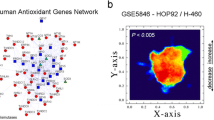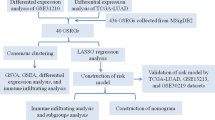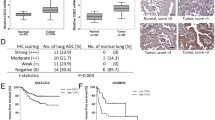Abstract
Purpose
The expression levels of human antioxidant genes (HAGs) and oxidative markers were investigated in light of lung adenocarcinoma aggressiveness and patient outcome.
Methods
We assayed in vitro the tumoral invasiveness and multidrug resistance in human lung adenocarcinoma (AdC) cell lines (EKVX and A549). Data were associated with several redox parameters and differential expression levels of HAG network. The clinicopathological significance of these findings was investigated using microarray analysis of tumor tissue and by immunohistochemistry in archival collection of biopsies.
Results
An overall increased activity (expression) of selected HAG components in the most aggressive cell line (EKVX cells) was observed by bootstrap and gene set enrichment analysis (GSEA). In vitro validation of oxidative markers revealed that EKVX cells had high levels of oxidative stress markers. In AdC cohorts, GSEA of microarray datasets showed significantly high levels of HAG components in lung AdC samples in comparison with normal tissue, in advanced stage compared with early stage and in patients with poor outcome. Cox multivariate regression analysis in a cohort of early pathologic (p)-stage of AdC cases showed that patients with moderate levels of 4-hydroxynonenal, a specific and stable end product of lipid peroxidation, had a significantly less survival rate (hazard ratio of 8.87) (P < 0.05).
Conclusions
High levels of oxidative markers are related to tumor aggressiveness and can predict poor outcome of early-stage lung adenocarcinoma patients.



Similar content being viewed by others
References
Blair SL, Heerdt P, Sachar S et al (1997) Glutathione metabolism in patients with non-small cell lung cancers. Cancer Res 57:152–155
Brennan P, Fortes C, Butler J et al (2000) A multicenter case–control study of diet and lung cancer among non-smokers. Cancer Causes Control 11:49–58
Burhans WC, Heintz NH (2009) The cell cycle is a redox cycle: linking phase-specific targets to cell fate. Free Radic Biol Med 47:1282–1293. doi:10.1016/j.freeradbiomed.2009.05.026
Cairns RA, Harris IS, Mak TW (2011) Regulation of cancer cell metabolism. Nat Rev Cancer 11:85–95. doi:10.1038/nrc2981
Castro MAA, Filho JLR, Dalmolin RJS et al (2009) ViaComplex: software for landscape analysis of gene expression networks in genomic context. Bioinformatics 25:1468–1469. doi:10.1093/bioinformatics/btp246
Castro MAA, Dal-Pizzol F, Zdanov S et al (2010) CFL1 expression levels as a prognostic and drug resistance marker in nonsmall cell lung cancer. Cancer 116:3645–3655. doi:10.1002/cncr.25125
Chaiswing L, Bourdeau-Heller JM, Zhong W, Oberley TD (2007) Characterization of redox state of two human prostate carcinoma cell lines with different degrees of aggressiveness. Free Radic Biol Med 43:202–215. doi:10.1016/j.freeradbiomed.2007.03.031
Chan HP, Tran V, Lewis C, Thomas PS (2009) Elevated levels of oxidative stress markers in exhaled breath condensate. J Thorac Oncol 4:172–178. doi:10.1097/JTO.0b013e3181949eb9
Cherian MG, Jayasurya A, Bay B-H (2003) Metallothioneins in human tumors and potential roles in carcinogenesis. Mut Res 533:201–209. doi:10.1016/j.mrfmmm.2003.07.013
Circu ML, Aw TY (2010) Reactive oxygen species, cellular redox systems, and apoptosis. Free Radic Biol Med 48:749–762. doi:10.1016/j.freeradbiomed.2009.12.022
Coate LE, John T, Tsao M-S, Shepherd FA (2009) Molecular predictive and prognostic markers in non-small-cell lung cancer. Lancet Oncol 10:1001–1010. doi:10.1016/S1470-2045(09)70155-X
Connor KM, Hempel N, Nelson KK et al (2007) Manganese superoxide dismutase enhances the invasive and migratory activity of tumor cells. Cancer Res 67:10260–10267. doi:10.1158/0008-5472.CAN-07-1204
Coursin DB, Cihla HP, Sempf J et al (1996) An immunohistochemical analysis of antioxidant and glutathione S-transferase enzyme levels in normal and neoplastic human lung. Histol Histopathol 11:851–860
Dresch MTK, Rossato SB, Kappel VD et al (2009) Optimization and validation of an alternative method to evaluate total reactive antioxidant potential. Anal Biochem 385:107–114. doi:10.1016/j.ab.2008.10.036
Englert RP, Shacter E (2002) Distinct modes of cell death induced by different reactive oxygen species: amino acyl chloramines mediate hypochlorous acid-induced apoptosis. J Biol Chem 277(23):20518–20526. doi:10.1074/jbc.M200212200
Esme H, Cemek M, Sezer M et al (2008) High levels of oxidative stress in patients with advanced lung cancer. Respirology 13:112–116. doi:10.1111/j.1440-1843.2007.01212.x
Gelain DP, Dalmolin RJS, Belau VL et al (2009) A systematic review of human antioxidant genes. Front Biosci (Landmark Ed) 14:4457–4463
Goh J, Enns L, Fatemie S et al (2011) Mitochondrial targeted catalase suppresses invasive breast cancer in mice. BMC Cancer 11:191. doi:10.1186/1471-2407-11-191
Ho JC, Chan-Yeung M, Ho SP et al (2007) Disturbance of systemic antioxidant profile in nonsmall cell lung carcinoma. Eur Respir J 29:273–278. doi:10.1183/09031936.00000106
Ilonen IK, Räsänen JV, Sihvo EI et al (2009) Oxidative stress in non-small cell lung cancer: role of nicotinamide adenine dinucleotide phosphate oxidase and glutathione. Acta Oncol 48:1054–1061. doi:10.1080/02841860902824909
Jaruga P, Zastawny TH, Skokowski J et al (1994) Oxidative DNA base damage and antioxidant enzyme activities in human lung cancer. FEBS Lett 341:59–64
Jorgenson TC, Zhong W, Oberley TD (2013) Redox imbalance and biochemical changes in cancer. Cancer Res 73:6118–6123. doi:10.1158/0008-5472.CAN-13-1117
Kaynar H, Meral M, Turhan H et al (2005) Glutathione peroxidase, glutathione-S-transferase, catalase, xanthine oxidase, Cu–Zn superoxide dismutase activities, total glutathione, nitric oxide, and malondialdehyde levels in erythrocytes of patients with small cell and non-small cell lung cancer. Cancer Lett 227:133–139. doi:10.1016/j.canlet.2004.12.005
Kinnula VL, Pääkkö P, Soini Y (2004) Antioxidant enzymes and redox regulating thiol proteins in malignancies of human lung. FEBS Lett 569:1–6. doi:10.1016/j.febslet.2004.05.045
Klamt F, Shacter E (2005) Taurine chloramine, an oxidant derived from neutrophils, induces apoptosis in human B lymphoma cells through mitochondrial damage. J Biol Chem 280:21346–21352. doi:10.1074/jbc.M501170200
Klamt F, Zdanov S, Levine RL et al (2009) Oxidant-induced apoptosis is mediated by oxidation of the actin-regulatory protein cofilin. Nat Cell Biol 11:1241–1246. doi:10.1038/ncb1968
Laurent A, Nicco C, Chereau C et al (2005) Controlling tumor growth by modulating endogenous production of reactive oxygen species. Cancer Res 65:948–956
Lehtonen ST, Svensk A-M, Soini Y et al (2004) Peroxiredoxins, a novel protein family in lung cancer. Int J Cancer 111:514–521. doi:10.1002/ijc.20294
Lisanti MP, Martinez-Outschoorn UE, Lin Z et al (2011) Hydrogen peroxide fuels aging, inflammation, cancer metabolism and metastasis: the seed and soil also needs “fertilizer”. Cell Cycle 10:2440–2449
Macedo GS, Lisbôa da Motta L, Giacomazzi J et al (2012) Increased oxidative damage in carriers of the germline TP53 p. R337H mutation. PLoS One 7:e47010. doi:10.1371/journal.pone.0047010
Marikovsky M, Nevo N, Vadai E, Harris-Cerruti C (2002) Cu/Zn superoxide dismutase plays a role in angiogenesis. Int J Cancer 97:34–41. doi:10.1002/ijc.1565
Melloni B, Lefebvre MA, Bonnaud F et al (1996) Antioxidant activity in bronchoalveolar lavage fluid from patients with lung cancer. Am J Respir Crit Care Med 154:1706–1711. doi:10.1164/ajrccm.154.6.8970359
Misra HP, Fridovich I (1972) The role of superoxide anion in the autoxidation of epinephrine and a simple assay for superoxide dismutase. J Biol Chem 247:3170–3175
Myung S-K, Kim Y, Ju W et al (2010) Effects of antioxidant supplements on cancer prevention: meta-analysis of randomized controlled trials. Ann Oncol 21:166–179. doi:10.1093/annonc/mdp286
Nishikawa M, Hashida M, Takakura Y (2009) Catalase delivery for inhibiting ROS-mediated tissue injury and tumor metastasis. Adv Drug Deliv Rev 61:319–326. doi:10.1016/j.addr.2009.01.001
Pani G, Galeotti T, Chiarugi P (2010) Metastasis: cancer cell’s escape from oxidative stress. Cancer Metastasis Rev 29:351–378. doi:10.1007/s10555-010-9225-4
Policastro L, Molinari B, Larcher F et al (2004) Imbalance of antioxidant enzymes in tumor cells and inhibition of proliferation and malignant features by scavenging hydrogen peroxide. Mol Carcinog 39:103–113. doi:10.1002/mc.20001
Polytarchou C, Hatziapostolou M, Papadimitriou E (2005) Hydrogen peroxide stimulates proliferation and migration of human prostate cancer cells through activation of activator protein-1 and up-regulation of the heparin affin regulatory peptide gene. J Biol Chem 280:40428–40435. doi:10.1074/jbc.M505120200
Rahman I, van Schadewijk AAM, Crowther AJL et al (2002) 4-Hydroxy-2-nonenal, a specific lipid peroxidation product, is elevated in lungs of patients with chronic obstructive pulmonary disease. Am J Respir Crit Care Med 166:490–495. doi:10.1164/rccm.2110101
Rahman I, Biswas SK, Kode A (2006) Oxidant and antioxidant balance in the airways and airway diseases. Eur J Pharmacol 533:222–239. doi:10.1016/j.ejphar.2005.12.087
Sánchez PG, Vendrame GS, Madke GR et al (2006) Lobectomy for treating bronchial carcinoma: analysis of comorbidities and their impact on postoperative morbidity and mortality. J Bras Pneumol 32:495–504. doi:10.1590/S1806-37132006000600005
Siegel R, Naishadham D, Jemal A (2013) Cancer statistics, 2013. CA Cancer J Clin 63:11–30. doi:10.3322/caac.21166
Sotgia F, Martinez-Outschoorn UE, Lisanti MP (2011) Mitochondrial oxidative stress drives tumor progression and metastasis: should we use antioxidants as a key component of cancer treatment and prevention? BMC Med 9:62. doi:10.1186/1741-7015-9-62
Subramanian A, Tamayo P, Mootha VK et al (2005) Gene set enrichment analysis: a knowledge-based approach for interpreting genome-wide expression profiles. Proc Natl Acad Sci USA 102:15545–15550. doi:10.1073/pnas.0506580102
Vichai V, Kirtikara K (2006) Sulforhodamine B colorimetric assay for cytotoxicity screening. Nat Protoc 1:1112–1116. doi:10.1038/nprot.2006.179
Wang D, Xiang D-B, Yang X-Q et al (2009) APE1 overexpression is associated with cisplatin resistance in non-small cell lung cancer and targeted inhibition of APE1 enhances the activity of cisplatin in A549 cells. Lung Cancer 66:298–304. doi:10.1016/j.lungcan.2009.02.019
Wendel A (1981) Glutathione peroxidase. Methods Enzymol 77:325–333
Wistuba II, Bryant D, Behrens C et al (1999) Comparison of features of human lung cancer cell lines and their corresponding tumors. Clin Cancer Res 5:991–1000
Yoo DG, Song YJ, Cho EJ et al (2008) Alteration of APE1/ref-1 expression in non-small cell lung cancer: the implications of impaired extracellular superoxide dismutase and catalase antioxidant systems. Lung Cancer 60:277–284. doi:10.1016/j.lungcan.2007.10.015
Acknowledgments
Brazilian funds MCT/CNPq Universal (470306/2011-4), PRONEX/FAPERGS (1000274), PRONEM/FAPERGS (11/2032-5), PqG/FAPERGS (2414-2551/12-8) and MCT/CNPq INCT-TM (573671/2008-7) provided the financial support without interference in the ongoing work.
Conflict of interest
The authors declare none.
Author information
Authors and Affiliations
Corresponding author
Electronic supplementary material
Below is the link to the electronic supplementary material.
Rights and permissions
About this article
Cite this article
Lisbôa da Motta, L., Müller, C.B., De Bastiani, M.A. et al. Imbalance in redox status is associated with tumor aggressiveness and poor outcome in lung adenocarcinoma patients. J Cancer Res Clin Oncol 140, 461–470 (2014). https://doi.org/10.1007/s00432-014-1586-6
Received:
Accepted:
Published:
Issue Date:
DOI: https://doi.org/10.1007/s00432-014-1586-6




